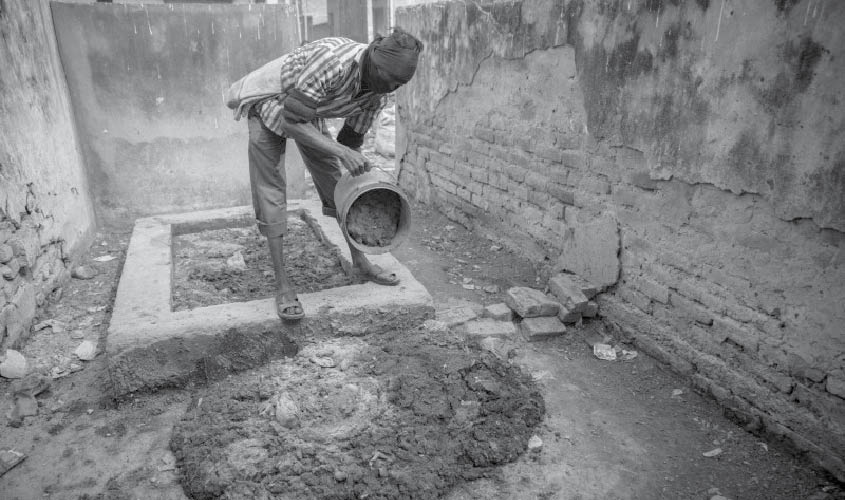While the officials are busy making Smart City project a success, sanitation workers continue to be neglected.
The death of two men and hospitalisation of three while cleaning a septic tank at an under-construction building in Delhi’s Rohini had a pattern. The continuance of manual scavenging despite a law against it, the contractor not providing safety gear, toxic fumes hurting the workers, coverage in the media. End of the story. It has been going on for years, and will continue, for such mishaps are the consequence of poor governance—something few politicians are bothered about—and general neglect.
The police told the media that the two men were reluctant to enter the tank without safety gear but were forced by the property owner and the contractor who employed them. The cops have registered a case under Section 304 (culpable homicide not amounting to murder), Section 3(J) of the Scheduled Castes and Scheduled Tribes (Prevention of Atrocities) Act, and Section 5/8 of the Prohibition of Employment as Manual Scavengers & Rehabilitation Act. That such stringent laws are unable to deter the culprits speaks volumes about the inefficacy of legislation. The efficacy of laws is a function of state capacity, which is lacking.
Loud rhetoric, fancy slogans, and special schemes are poor substitutes for state capacity augmentation. But, unfortunately, this is exactly what our political masters are doing. So, we have the ambitious Smart Cities Mission which “is meant to set examples that can be replicated both within and outside the smart city, catalysing the creation of similar smart cities in various regions and parts of the country.”
The Congress-led government had its own totem. The Jawaharlal Nehru National Urban Renewal Mission aimed “to encourage reforms and fast-track planned development of identified cities. Focus is to be on efficiency in urban infrastructure and service delivery mechanisms, community participation, and accountability of ULBs [urban local bodies]…”
On the face of it, there is everything to ensure that such accidents don’t take place; there are politicians and officials making big claims, there is a law banning manual scavenging, there are government schemes to make cities better. And yet there is urban reality. Our cities are characterised with strewn garbage, overflowing drains, inadequate sewage treatment, ineffectual solid waste management, bumpy roads, clogged drains that cause water-logging, open manholes into which people regularly fall and often die, sanitation workers dying while manually cleaning septic tanks and sewers.
It is not just politicians and bureaucrats who are apathetic towards sanitation workers; the intellectual class, the media, and society too are insouciant towards them. Intellectuals are too engrossed in the grand plans of redistributing wealth and property, socially engineering the world, and ending inequalities that they have little time or inclination to worry about the folks who clean drains. They peddle big state projects like universal basic income scheme and prepare a climate of opinion to make dirigisme possible; not for them anything so petty and local as the safety of drain cleaners.
The media, too, is not much interested in these unfortunate people. This is primarily because they haven’t been beatified as holy cows in public discourse and folklore like, say, soldiers and farmers. Not that the media has anything against sanitation workers; it’s just that they are not sexy enough.
Paid a pittance, seldom provided with safety gear, and having little social security, they soldier on—relying mostly on each other’s support. Even exemplary heroism on their part goes unnoticed. An excellent news report in Hindustan Times (7 August 2017) by Shiv Sunny narrated the story of great courage and exceptional camaraderie of sanitation workers. The story appeared in the wake of the death of three men died inside a sewer manhole in Lajpat Nagar.
A labourer fell victim to the noxious fumes, but his friend wanted to help him and jumped inside. Within seconds, he too began suffocating and throwing his limbs around. This didn’t deter the third labourer from entering the manhole to attempt a rescue; it too proved to be futile and fatal. Yet, the fourth one tried to save his colleagues, but was stopped by the crowd that had gathered.
We don’t even notice such bravery and solidarity because sanitation workers are practically invisible; they are not just at the bottom of the pyramid but also on the margins of society. Most of them are Dalits, the descendants of Shudras who were doctrinally and scripturally discriminated against for centuries. To be glorified in political speeches—and neglected in reality.
It is not that we, as a nation, are hardheaded, unfeeling people. There is solicitude in our collective psyche, but it is aroused by emotion and cant, and not by facts, empathy, or wisdom. And a nation that is guided by sentiment and sanctimony rather than reason and judiciousness can scarcely be expected to have genuine human concern and empathy. Certainly not for sanitation workers.

